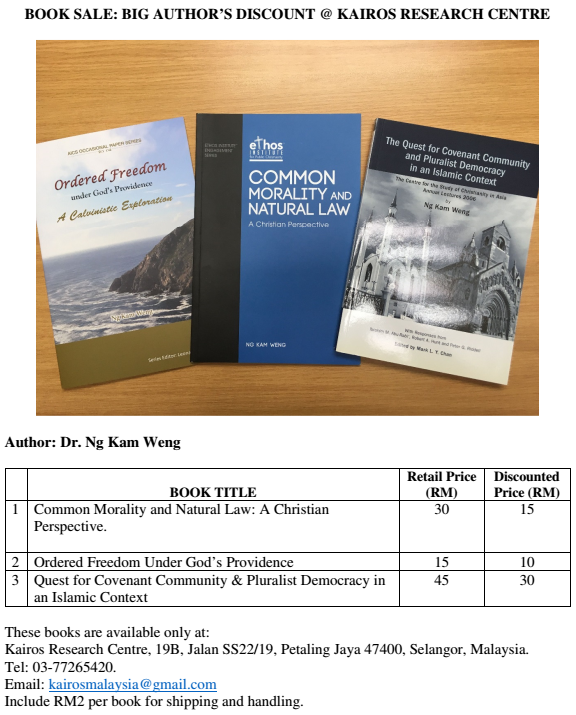
BOOK SYNOPSES
1. Common Morality and Natural Law: A Christian Perspective (Bible Society of Singapore, 2016), 69pp.
The purpose of this book is to explore how Christians may find common moral grounds with fellow citizens so that they can work together for the betterment of the commonwealth. It explores certain social realities that must be accepted by all citizens, in particular, the condition of the public arena with its dominant political paradigm of secular democracy; and how one can use of common values as the minimum moral framework for social interaction is consistent with the natural law theory.
Secularism, as an ideology requiring the exclusion of religion from discourse in common life, is perceived to be antithetical to the Christian faith. This raises the question about the necessity and limits of Christian engagement with wider society. Common morality does not pretend to be a complete theory. Nevertheless, it provides a workable rule of thumb to help people make rational judgment of their moral actions.
Natural law refers to basic values and moral norms discovered from concrete human experience. It is an objective moral order since it is grounded in reality. It describes a set of desired social goods as well as the obligations that must be fulfilled to attain a thriving community. The task of the Christian covenant community is to nurture the relational capacities of its members and strengthens their virtue of moral trustworthiness. To this end, Christians who are imbued with the covenant way of life are empowered to work with their neighbors to build a robust moral citizenry to prevent conflict that ever threatens peace in a pluralistic society.
2. Ordered Freedom under God’s Providence: A Calvinistic Exploration (Asian Institute of Calvin Studies, 2016), 33pp.
Calvin’s theology represents a coherent system of life, and a comprehensive vision for cultural transformation and the right ordering of society. In this regard, Calvin’s theology of the covenant, and his positive regard for creation orders, offers a social vision of mutual accountability and institutional pluralism characterized by both separation and yet interdependence between religious and political institutions.
Finally, Calvin’s theology of Christian freedom, mediated by God’s grace and ordered by God’s providential care, encourages and guides Christians to purposive and disciplined participation in a program for social sanctification, and building of social institutions to serve the welfare of one’s neighbors.
3. The Quest for Covenant Community and Pluralist Democracy in an Islamic Context (Trinity Theological College, 2008), pp. 162pp.
This book explores the possibility of democratic pluralism from within the predominantly Islamic context of Malaysia, and proposes the concept of Covenant as a promising basis for collaboration between Christianity and Islam. Interacting with a broad spectrum of socio-political thinkers, the book probes the dynamics of democratic deliberation and points to resources from within the two faith traditions that can contribute to building the common life based on covenant community and social solidarity [This book is out of stock]